Ginger has many positive health benefits that you can take advantage of in addition to its delicious flavor. Here are some things you should know about the various ways ginger may enhance the taste of your meal and promote your health.
Southeast Asia is where ginger, or Zingiber officinale, originated. Ginger’s plump, knobby rhizomes, or underground stems, are highly valued for culinary and medicinal purposes, however some Asian cuisines use the plant’s fresh above-ground stems.
Ginger can be preserved, ground, dried, or used fresh. In addition to adding a warm, spicy touch to tea, baked goods, and other sweet sweets, it gives savory meals like stir-fries and curries a zesty flavor.Get up to 45% off at Aquasana with code LS
Ginger’s Health Benefits

Ginger is more than just tasty. A naturally occurring component of ginger root, gingerol promotes gastrointestinal motility, or the speed at which food leaves the stomach and moves on to the next stage of digestion. Consuming ginger promotes effective digestion, which shortens the time that food remains in the stomach.The following 15 health benefits of ginger are
1: Maintains the Health of Your Mouth

The antimicrobial properties of ginger may also make you grin. Gingerols, active ingredients in ginger, prevent the growth of oral microorganisms. These same germs are responsible for the dangerous gum infection known as periodontal disease.
2: Gas Reduction and Better Digestion

Numerous research have looked into ginger’s effects on the gases that develop in the digestive tract during digestion, according to a 2018 review (Trusted So). According to this study, ginger’s enzymes can aid in the breakdown and release of this gas, relieving any discomfort. Furthermore, studies indicate that ginger may facilitate better passage through the digestive system, which could help alleviate or avoid constipation. Additionally, ginger seems to have health benefits. Reliable Source on the pancreatic lipase enzyme, which facilitates small intestine digestion.
3: Increases Immunity
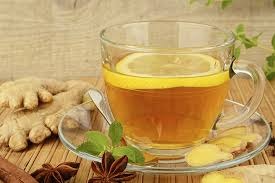
The bioactive ingredient in ginger, gingerol, has antibacterial and antifungal qualities that boost your defenses. It is a potent ally against colds and the flu since it also includes anti-inflammatory and antioxidant compounds.
- Ginger relieves headaches, coughs, and fevers.
- Its qualities can help you stay at your best by reducing the symptoms of the flu and common cold.
Adding ginger to your diet strengthens your body’s defenses.
4: Reduces upset Stomach and Nausea

Ginger’s ability to reduce nausea is among its best-known health advantages. Ginger provides natural relief from motion sickness, migraines, and pregnancy.
- The stomach is calmed by its anti-inflammatory qualities.
- Ginger inhibits the signals that cause nausea and vomiting and controls hormones.
Try the anti-nausea properties of fresh ginger root or tea.
5: Inflammation Reduction

Ginger is “modestly efficacious and reasonably safe” when used orally to treat osteoarthritis-related inflammation, according to a 2015 review.The authors of the meta-analysis did point out that the studies included in it were tiny and might not be representative of the broader population. In the meanwhile, ginger’s phytochemical qualities may help reduce inflammation, according to a 2017 analysis of 16 clinical trials. These scientists also urged more investigation into the best forms and dosages of ginger extract.
6: Potential Benefits for Cancer
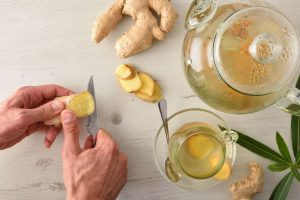
Because ginger reduces inflammation and stops some cancer cells from growing, it may be used in conjunction with conventional cancer treatments. Additionally, its antioxidant qualities aid in shielding the body from oxidative stress.
- Ginger may help prevent pancreatic, colon, and ovarian cancers, according to studies.
- It aids in the management of nausea and vertigo brought on by chemotherapy.
Ginger can be a helpful supplement to a comprehensive cancer treatment plan, even though it is not a cure.
7: Reduces Muscle Soreness

Ginger may eventually reduce muscle discomfort, but it won’t instantly eliminate it. In several trials, participants who took ginger to relieve post-exercise muscular aches experienced less pain the following day than those who did not.
8: Improved Skin Health

Ginger improves the health and appearance of your skin in a number of ways. Its vitamins, minerals, and antioxidants enhance circulation and hydration.
- Ginger reduces the breakdown of collagen and shields the skin from UV rays.
- Because of its antibacterial qualities, it can help reduce scarring and alleviate acne symptoms.
Ginger maintains a healthy, young complexion by encouraging natural brightness.
9: Ginger may help in Reducing Cholesterol Levels
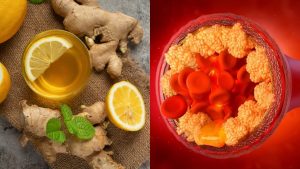
Elevated LDL (bad) cholesterol is associated with a higher risk of heart disease. According to a 2022 reviewTrusted Source of 26 trials, eating ginger raised HDL cholesterol while dramatically lowering LDL and triglyceride levels. Effective dosages were even lower than 1,500 mg daily. But incorporating such large amounts of ginger into your diet could be challenging, especially if you dislike the way ginger tastes.
10: Reduces the Symptoms of Arthritis

Ginger decreases swelling since it has anti-inflammatory properties. That could be particularly beneficial for managing osteoarthritis and rheumatoid arthritis symptoms. Taking ginger orally or applying a ginger compress or patch topically may help reduce discomfort and swelling.
Spend $45+ & Get A Midnight Kit | Code: NIGHT | 3.27.25-3.30.25
0.011: Reduces Menstrual Pain

Are you experiencing menstrual cramps? Ginger powder could be useful. Women who took 1,500 mg of ginger powder once daily for three days during their menstrual cycle reported less discomfort than those who did not, according to studies.
12: Support for Weight Loss

According to certain research, ginger may help with weight loss by enhancing calorie burning and metabolism. It is a useful supplement because of its thermogenic qualities and capacity to regulate insulin levels.
- Ginger helps reduce overeating by promoting feelings of fullness.
- It might increase energy and help with recuperation from exercise.
Ginger works best when combined with other healthy lifestyle choices.
13: Reduces Blood Sugar
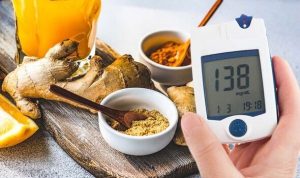
Ginger may improve your body’s utilization of insulin, according to a recent small study. Further research is required to determine whether ginger can lower blood sugar levels.
14: Maintaining Heart Health

Ginger extract may help reduce cardiovascular disease, according to some studies.
A 2017 investigation Daily ginger use may help prevent fatty liver disease, high blood pressure, diabetes, hyperlipidemia, cerebrovascular disease, and coronary heart disease, according to a Trusted Source survey of 4,628 persons. The authors came to the conclusion that ginger might be useful as a therapy for prevention. More research will be needed to determine whether ginger can help treat cardiovascular disease. In the meanwhile, ginger extract was discovered to help lower the incidence of cardiac problems in diabetic rats in a modest 2016 . The authors pointed out that the extract’s antioxidant qualities might be partially responsible for this decrease.NEW! Vanilla Plant-Based Protein
15: Enhances Brain Activity
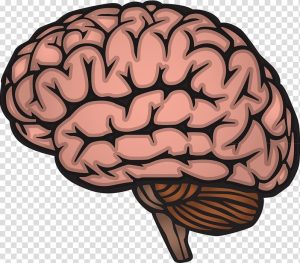
By lowering oxidative stress and inflammation, ginger may shield the brain from age-related deterioration. This can enhance mental wellness and help avoid diseases like Alzheimer’s.
- Ginger improves focus, memory, and response time.
- It reduces anxiety and sadness by increasing the production of serotonin and dopamine.
Including ginger in your diet promotes emotional equilibrium and cognitive performance.
Ginger Background and Origin
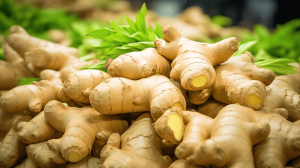
Thus, ginger belongs to the same plant family as turmeric and cardamom. The presence of ketones, particularly gingerols, which seem to be the principal ingredient of ginger examined in the majority of health-related scientific studies, is primarily responsible for its pungent scent. The rhizome, or horizontal stem from which the roots grow, is the main edible portion of ginger.
Although ginger’s modern name is derived from the Middle English gingivere, its look suggests that it originated almost 3,000 years ago as the Sanskrit word srngaveram, which means “horn root.” It was known as ziggiberis in Greek and zinziberi in Latin. It’s interesting to note that ginger doesn’t grow naturally, and its true origins are unknown.
For more than 5000 years, Indians and Chinese are thought to have grown ginger as a tonic root to cure a variety of illnesses. Today, the plant is grown all throughout the humid tropics, with India being the biggest producer. Ginger had been used as a flavoring long before history was officially written. More than two millennia ago, it was exportable from India to the Roman Empire, where its therapeutic qualities made it a highly coveted commodity.
For centuries, Arab traders dominated the trade in ginger and other spices, making ginger a highly sought-after product in Europe even after the collapse of the Roman Empire. During the 13th and 14th centuries, a pound of ginger was worth as much as a sheep. It was imported in preserved form for use in confections by the Middle Ages. It is said that the gingerbread man, a favorite Christmas dessert, was created by Queen Elizabeth I of England.
Easy methods to include ginger in your diet
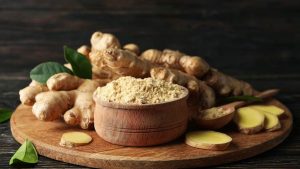
Just peel and slice a fresh knob of ginger, then cover it with boiling water to make your own ginger tea. For a delightful beverage that is healthier than the majority of commercially available ginger drinks, which are sometimes heavy in sugar, steep it for up to ten minutes.
A flexible and shelf-stable approach to include ginger in your diet is with ginger powder. It’s commonly used to soups, stews, and dry rubs, as well as utilized in baked products.
The next time you make gingersnaps, though, don’t limit yourself to just ground ginger; you can also include crystalized ginger to your recipe, or even better, peeled and grated fresh ginger.
Additionally, don’t overlook the savory side of ginger: peeled and chopped (or grated) ginger adds a nice touch to stir-fries that include chicken or tofu. Try it with unsalted peanuts, broccoli, red peppers, and snap peas. When you add your garlic, you can add the chopped ginger. Finally, finish with a sauce made with soy and sesame oil and slightly sweetened with brown sugar.
Tips for pick and keep fresh ginger

Usually, ginger is sold by the pound. Select ginger that feels firm to the touch and has thin, taut skin and flesh that separates from the main body with ease. Don’t worry if the flesh has a blue or green tint; it doesn’t impair the flavor and is safe to eat. However, you should steer clear of any sections that are soft places or that have shriveled up. Because they are simpler to peel, look for large roots with fewer bumps or knobs.
Ginger can be kept in a plastic bag with the air removed or in the crisper drawer with vegetables. Ginger can also be kept in the freezer if it’s not used often. Before freezing it, be sure to wash and dry it. You can freeze it in the desired form, such as peeled, sliced, chopped, minced, or whole.
Summary
Ginger may help with pain relief, inflammatory reduction, and digestive health, according to some research.
However, very high extract dosages are frequently tested in investigations. Adding extra ginger to one’s diet might not have any beneficial health consequences.
Additionally, research on ginger’s health benefits has frequently been limited or inconclusive. Further research is necessary to fully understand the effects and safety of ginger supplements.
Frequently Asked Questions
Which organ benefits from ginger?
A naturally occurring component of ginger root, gingerol promotes gastrointestinal motility, or the speed at which food leaves the stomach and moves on to the next stage of digestion. Consuming ginger promotes effective digestion, which shortens the time that food remains in the stomach. alleviation from nausea.
How Much Ginger Is Enough for a Day?
For maximum health advantages, including lowering inflammation and nausea, it is generally advised to ingest up to 3–4 grams of ginger daily. Individual tolerance, health objectives, and situations, such as pregnancy or other health-related issues, should be taken into account, nevertheless.
What’s the best way to eat ginger?
To produce a tea that soothes the throat and strengthens the immune system, steep chopped raw ginger in boiling water. Simply chop the fresh ginger and use it to stir-fries, soups, and baked goods.
What is the best way to preserve fresh turmeric?
Turmeric powder, like all spices, should be kept out of direct sunlight and moisture in an airtight container. You’ll have the ideal cool, shadowy spice drawer. You may store fresh turmeric in your freezer for up to six months or in the fridge for a few weeks.
How much time does it require to boil ginger for tea?
The tea will get more flavorful and spicy the longer you boil fresh ginger in water. For a full-flavored, ginger-forward tea, I suggest simmering the ginger and water mixture for ten minutes. If you prefer an even spicer tea, you can simmer it for even longer.










